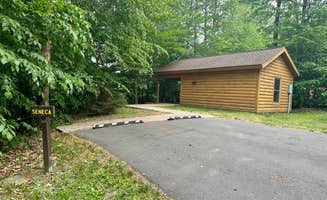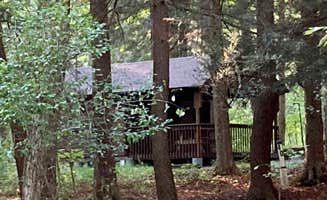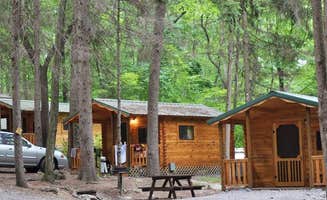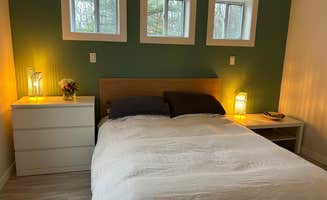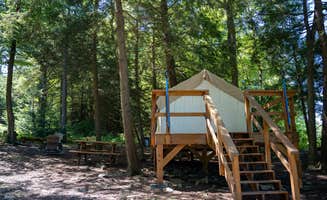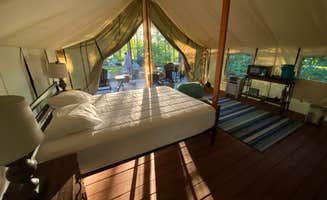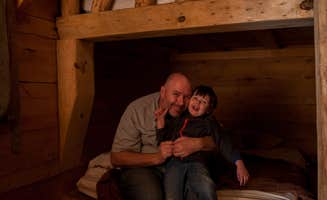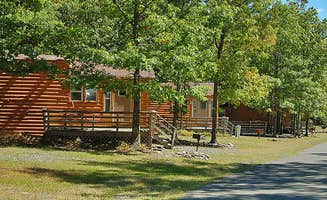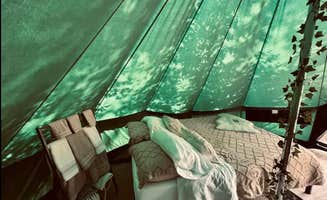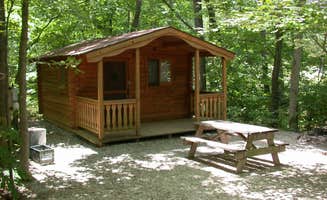Camping in the forested highlands surrounding Wilkes-Barre, Pennsylvania offers elevations ranging from 1,000 to 2,000 feet above sea level. Fall temperatures typically drop to 40°F at night, requiring cold-weather gear and proper insulation in tents and yurts. Most campgrounds in the region remain open through mid-October, with select locations offering extended or year-round access.
What to do
Waterfall hiking trails: At Ricketts Glen State Park Campground, visitors can access 22 waterfalls via a moderate 4-mile trail system. "We saw 18 of them on a four-mile moderate hike, but if you want to see the additional four, you could make it a seven-mile hike. The trails are very well marked," notes a visitor who spent time exploring the falls.
Lakeside recreation: Campers at Tobyhanna State Park Campground can use the designated water access points for non-motorized watercraft. "There's a separate shore for kayaks and canoes to enter the lake," explains one reviewer. The park also maintains fishing areas along the dam spillway, described as "very picturesque with the cascading water."
Mountain biking access: Local trail networks connect to several campgrounds in the region. "The D&L trail also runs at the back of the campground, giving great bike access to mauch chunk lake," reports a visitor at Jim Thorpe Camping Resort. These trails provide moderate terrain suitable for intermediate riders with connections to longer routes throughout the Poconos.
What campers like
Natural wildlife viewing: Tuscarora State Park Campground offers opportunities to observe local fauna in their natural habitat. "We even got to see an eagles' nest near our campsite," mentions one camper who visited the area. The forest setting provides shelter for various wildlife species including black rat snakes that are commonly spotted near campsites.
Modern yurt accommodations: Multiple state parks near Wilkes-Barre feature yurt camping options with substantial amenities. At Lackawanna State Park, yurts include "heat and fans. Full size refrigerator, stove and microwave. No water but directly across from facilities with basin sinks outside for cleaning dishes." This provides comfortable yurt camping near Wilkes-Barre, Pennsylvania without sacrificing the outdoor experience.
Clean facilities: Mauch Chunk Lake Park maintains well-serviced campground infrastructure. "Bathrooms were decently clean," notes one reviewer who appreciated the maintenance levels despite high seasonal usage. Several campgrounds in the region feature recently renovated shower buildings with hot water and regularly cleaned facilities.
What you should know
Bear precautions required: Wildlife management is necessary at most campgrounds around Wilkes-Barre. "We were warned at check in that there have been a lot of bears in the area but never really thought that we would see one. As soon as we got to our site one came right up as we were setting up our tent," reports a visitor at Tobyhanna State Park. Food storage protocols are strictly enforced.
Campsite spacing varies significantly: Mount Pocono Campground offers larger sites than some state park options. "The sites were spacious," explains a reviewer, while at other locations "the sites were very close together with very little privacy." Research specific site dimensions before booking, especially during peak season.
Cell service limitations: Connectivity varies dramatically throughout the region. At Tuscarora, a visitor notes: "If you want to be disconnected, literally because there is no cell service, then this is the place for you." Signal strength depends on carrier and terrain, with higher elevation campsites generally receiving better coverage.
Tips for camping with families
Playground access: Red Rock Mountain Campground provides traditional play equipment with proximity to Ricketts Glen. "It is so nice to hear families playing games with their new outdoor game area," mentions a repeat visitor who appreciates the recreational facilities for children. Most campgrounds in the area maintain designated children's areas.
Educational programming: Several state parks offer structured learning activities for younger visitors. "The visitors center boasts the most modern updates and a truly lovely interactive museum displaying the history and current wildlife of the park," reports a visitor to Hickory Run State Park who enjoyed the educational exhibits with their family.
Swimming options: Many campgrounds provide monitored swimming areas with varying amenities. "The lake is very nice a little copper kind of like iced tea color but was very nice," describes a parent who visited Tobyhanna with their 7-year-old. Most swimming areas include shallow sections for younger children with deeper sections separated by buoy lines.
Tips from RVers
Site leveling challenges: Many campgrounds require preparation for uneven terrain. At Keen Lake Resort Campground, an RVer observed, "The sites seemed a little narrow when we first pulled in, but it was plenty." Visitors should bring leveling blocks, as several reviews mention unlevel sites requiring adjustment for proper RV setup.
Hookup reliability: Electrical systems at some campgrounds have capacity limitations. "Two electric hookups would trip the 50 amp circuit breaker on any load about 30 amps, which means the hookups are old and unmaintained," warns an RVer at Lackawanna State Park. Check amperage ratings before arrival and consider running fewer appliances during peak usage periods.
Size restrictions: Large rigs face limitations at certain campgrounds. "The RV sites are not very defined, level or rock free. Makes it fun searching for a good position within the site," notes a visitor to Jim Thorpe Camping Resort. Many state parks cannot accommodate rigs longer than 40 feet, while private campgrounds typically offer more suitable options for larger vehicles.


